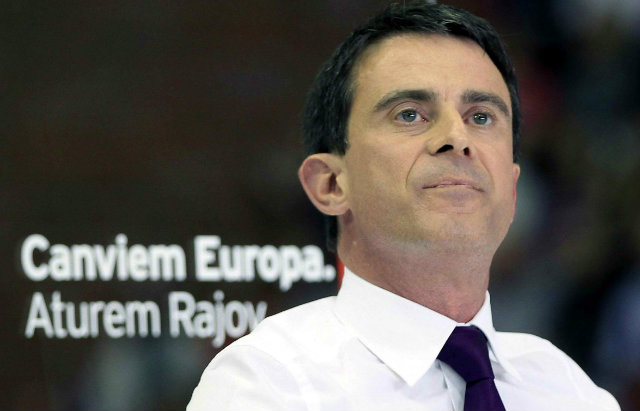SUMMARY
This is AI generated summarization, which may have errors. For context, always refer to the full article.

BRUSSELS, Belgium – Europe reeled on May 26, Monday, after eurosceptic and far-right parties delivered a stinging rebuke to Brussels with France’s National Front (FN) and Britain’s Independence Party (UKIP) leading the pack of anti-EU parties. (READ: All eyes on sceptics)
“Earthquake” in Europe, read headlines, summing up a day of trauma for establishment parties and an accepted consensus that the European Union offers the best future for all.
A dismayed French Prime Minister Manuel Valls said he could not understand the “massive abstention” of Socialist voters that left his party a distant third with just 14% of the vote to a rampant National Front which topped Sunday’s poll with 25%. (READ: Political earthquake in France)
In response, pro-European Union parties must offer disillusioned voters the real prospect of jobs and growth, Valls said, refusing to step down after just weeks in office.
“I am convinced that Europe can be re-oriented to increase support for growth and employment, which it hasn’t done in years,” Valls said.
“Certainly there is a message across Europe of disillusionment with Europe and the EU has got to hear that loud and clear,” said Foreign Secretary William Hague in Britain, where Nigel Farage’s UKIP scored a stunning victory with 27% of the vote.
“This is just about the most extraordinary result in British politics for over 100 years,” Farage said, promising more to come. “The penny has really dropped.”
European Commission head Jose Manuel Barroso put the best gloss on the outcome, stressing that combined, the pro-EU camp of the center-right, center-left and Liberals would still have “a very solid and workable majority in the European Parliament”.
“Standing together as Europeans is indispensable for Europe to shape a global order where we can defend our values and interests,” Barroso said, adding that decisive action to provide growth and jobs would be the best answer to current concerns.
Analysts said it was clear that voters came out to support anti-euro and anti-immigration parties who had tapped into growing voter frustration after years in the economic doldrums pushed unemployment to record highs while governments cut spending to balance the public finances at Brussel’s behest.
Latest seat projections
Parliament’s latest projections give the center-right European People’s Party 214 seats in the new 751-seat assembly, with the Socialists on 189 and the ALDE Liberals 66, followed by the Greens on 52.
The anti-EU vote should produce about 140 seats in all, giving them enough of a voice in the new assembly to live up to promises to weaken the EU from the inside.
Analysts noted, however, that these parties face a potential problem in that to form an official Parliamentary group, they must get at least 25 MEPs from a minimum seven of the EU 28 member states.
Some might struggle to meet that requirement.
For example, the FN will have 24 of the 74 seats for France, a good start that will also weaken France’s clout in the Parliament.
But UKIP for example refuses any ties with the FN because it says it is anti-Semitic, meaning the French group will have to look to smaller, extreme parties such as Holland’s PVV.
The fact that the EPP and Socialists remain the two biggest groups means there is no reason to believe the anti-EU vote is fatal, indeed far from it.
“By and large, the EU elections delivered roughly the expected protest vote,” said Holger Schmieding of Berenberg Bank.
“Austerity and reforms are painful; immigration is contentious even at the best of times. Voters used the EU elections to let off steam. No surprise.”
Sunday’s vote “was probably the high water mark of anti-EU sentiment. As economic growth gains some momentum… anti-EU sentiment will likely subside somewhat in coming years,” Schmieding said in a note entitled: “Not quite an Earthquake.”
In Germany, Europe’s all important economic power house, there was better news for the pro-EU camp as Chancellor Angela Merkel’s conservative party won over 36% of the vote, while its coalition partner, the center-left Social Democrats, scored some 27%.
Some analysts – and many officials – also highlighted that voter turnout, having fallen steadily since 1979, edged up very slightly to 43.1% from 43% in 2009, suggesting that the worst in voter disinterest with the EU might be over.
Financial markets welcomed the outcome. In Italy, stocks jumped more than 3.0% in early trade after Prime Minister Matteo Renzi won by a landslide, seeing off the eurosceptic Five Star Movement of Beppe Grillo with 40.8% of the vote to 21.2%.
In Paris, the bourse was up 0.33% and Frankfurt put on 0.94%. London was closed for a public holiday. – Rappler.com
Add a comment
How does this make you feel?
There are no comments yet. Add your comment to start the conversation.